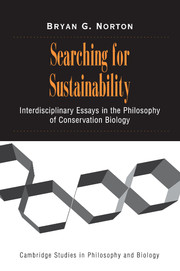Book contents
- Frontmatter
- Contents
- Searching for Sustainability
- General Introduction: An Interdisciplinary Experiment
- I PRAGMATISM AS AN ENVIRONMENTAL PHILOSOPHY
- II SCIENCE, POLICY, AND POLICY SCIENCE
- III ECONOMICS AND ENVIRONMENTAL SUSTAINABILITY
- 10 Sustainability, Human Welfare, and Ecosystem Health
- 11 Economists' Preferences and the Preferences of Economists
- 12 Evaluating Ecosystem States: Two Competing Paradigms
- 13 Sustainability: Ecological and Economic Perspectives, with Michael A. Toman
- 14 The Evolution of Preferences: Why ‘Sovereign’ Preferences May Not Lead to Sustainable Policies and What to Do about It, with Robert Constanza and Richard C. Bishop
- IV SCALING SUSTAINABILITY: ECOLOGY AS IF HUMANS MATTERED
- V SOME ELEMENTS OF A PHILOSOPHY OF SUSTAINABLE LIVING
- VI VALUING SUSTAINABILITY: TOWARD A MORE COMPREHENSIVE APPROACH TO ENVIRONMENTAL EVALUATION
- Index
- References
12 - Evaluating Ecosystem States: Two Competing Paradigms
Published online by Cambridge University Press: 21 January 2010
- Frontmatter
- Contents
- Searching for Sustainability
- General Introduction: An Interdisciplinary Experiment
- I PRAGMATISM AS AN ENVIRONMENTAL PHILOSOPHY
- II SCIENCE, POLICY, AND POLICY SCIENCE
- III ECONOMICS AND ENVIRONMENTAL SUSTAINABILITY
- 10 Sustainability, Human Welfare, and Ecosystem Health
- 11 Economists' Preferences and the Preferences of Economists
- 12 Evaluating Ecosystem States: Two Competing Paradigms
- 13 Sustainability: Ecological and Economic Perspectives, with Michael A. Toman
- 14 The Evolution of Preferences: Why ‘Sovereign’ Preferences May Not Lead to Sustainable Policies and What to Do about It, with Robert Constanza and Richard C. Bishop
- IV SCALING SUSTAINABILITY: ECOLOGY AS IF HUMANS MATTERED
- V SOME ELEMENTS OF A PHILOSOPHY OF SUSTAINABLE LIVING
- VI VALUING SUSTAINABILITY: TOWARD A MORE COMPREHENSIVE APPROACH TO ENVIRONMENTAL EVALUATION
- Index
- References
Summary
INTRODUCTION: ENVIRONMENTAL POLICY AND ANALYSIS: A SHARED CRISIS
Environmental management faces a crisis: legislation, high-level committees, and international agreements all urge that natural systems be managed to protect their health and systematic integrity, but these widely employed analogies have not yet yielded a consensus in operational and specific management directives. Inaction may not be an option, however, because observable trends in the quality of the environment are forcing upon us the conclusion that traditional approaches to resource management are inadequate to the problems of today. Thus, while there is a growing consensus among ecologists, managers, and environmentalists that we must supplement traditional concerns for human health with more ecosystem-oriented management criteria, this consensus has not led to major changes in management or environmental decision-making.
Unfortunately, this crisis in management has an analogue in environmental policy analysis, the very place where one might first search for new directions for management. While there exists no shortage of arguments showing why we need more comprehensive, systematic management objectives, there is a foundational disagreement among policy analysts regarding how environmental objectives should be formulated, discussed, and analyzed. I believe these foundational disagreements can best be understood as “extraparadigmatic” disagreements. A “paradigm” is here defined as a constellation of concepts, values, and assumptions, as well as accepted practices, that give unity to a scientific discipline (Kuhn, 1970).
- Type
- Chapter
- Information
- Searching for SustainabilityInterdisciplinary Essays in the Philosophy of Conservation Biology, pp. 201 - 224Publisher: Cambridge University PressPrint publication year: 2002

